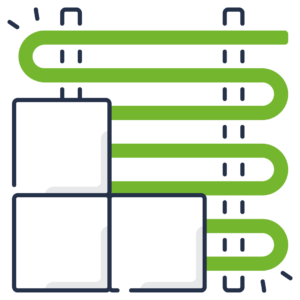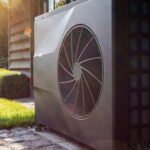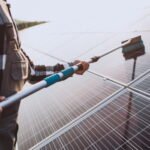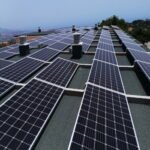 Looking for the best Solar Panels Malaga has to offer? Then look no further. Located in the heart of the Costa del Sol, with offices in Marbella, Málaga, and Pueblo Nuevo, San Roque in Cádiz, Solares Energies is ideally positioned to cater to all your solar energy needs across Andalucía. Our strategic locations enable us to deliver unparalleled solar solutions right where you need them.
Looking for the best Solar Panels Malaga has to offer? Then look no further. Located in the heart of the Costa del Sol, with offices in Marbella, Málaga, and Pueblo Nuevo, San Roque in Cádiz, Solares Energies is ideally positioned to cater to all your solar energy needs across Andalucía. Our strategic locations enable us to deliver unparalleled solar solutions right where you need them.  Leading the Solar Revolution in Southern Spain At Solares Energies, we’ve been lighting up lives with solar energy for years, serving not just Málaga and its surrounding areas but also extending our expertise throughout the diverse and vibrant region of Andalucía.
Leading the Solar Revolution in Southern Spain At Solares Energies, we’ve been lighting up lives with solar energy for years, serving not just Málaga and its surrounding areas but also extending our expertise throughout the diverse and vibrant region of Andalucía.
We’re on a mission to equip homes and businesses with durable, efficient, and sustainable solar solutions, guiding our clients on their journey to a greener future.
We are not just suppliers of solar systems; we are comprehensive solar service experts. Our commitment to you extends from initial consultation and bespoke solar system supply to professional installation and ongoing maintenance. Explore our Solar Panel Installation and maintenance services for a glimpse into our quality and dedication.
Believing strongly in the sun as a boundless, eco-friendly energy source, we offer a range of top-tier solar panel systems. These systems are not only effective and efficient but also play a crucial role in fostering a sustainable environment.
Solar Panels Spain: Solares Energies provides customised solar panel installations for a variety of settings, from residential homes to commercial establishments throughout Andalucía. Our solar solutions are designed to offer reliable, clean energy, significantly reducing your electricity costs and environmental impact. Collaborating closely with you, we create solar systems that align with your specific energy needs and budget, handled by our team of experienced technicians from start to finish.
With innovative options like Solar Carports, we enable you to harness the sun’s energy, offering a sustainable, cost-effective power alternative for your property. Contact Solares Energies today to discover more about our solar services and how we can assist you in saving money while contributing positively to the environment.
At Solares Energies, we believe in the power of the sun as an inexhaustible, clean, and economical energy source. Our selection of top-tier solar panel systems is not only efficient but contributes to a more sustainable future.

Solar Panel Systems Spain – What are they? Solar energy is the biggest and most effective source of renewable energy for homes & businesses. Solar panel Systems are used to harvest the natural power of the sun to create electricity to heat and power homes and businesses. Your system can either produce electricity or heat your water whilst reducing the amount of carbon dioxide you produce and the amount of money you spend.
It is a common misconception that the sun must be directly shining on a solar panel for it to work efficiently, as this is not true. They can still produce electricity even on dull days, but they will work far more efficiently on sunny days in the summer than in winter as the sun is higher in the sky.
Solar panels give a greener alternative to other forms of power, such as central heating, as they do not pollute or emit greenhouse gases whilst operating. Solar panel technology has advanced hugely over the last 10 years and is advancing further each day, especially with the introduction of Solar battery storage. Historically you would only benefit from solar panels, throughout the day as there wasn’t a facility to store that generated energy, now with the introduction of solar panel batteries, that stored energy can be used through the evening, to power the property or even charge your electric vehicle.
Solar panel systems with battery storage are now, more than ever accessible and affordable, and could save homes and businesses hundreds of pounds a year on electricity bills.
Solar power works using individual Photovoltaic or PV cells, joined together to form a panel system. They can then convert energy from the sun and generate electricity for use around your home or business. – Save the planet whilst reducing your electricity bill, using a Solar Panel System.
Solar panels take advantage of one of nature’s most powerful yet free resources: the energy produced by the sun. Solar panels, also known as photovoltaic systems (PV systems), use semiconductor technology to convert energy from sunlight into electricity that can power your household. – Also see, Commercial Solar Panels

Are you contemplating the installation of a solar panel system for your home but feeling overwhelmed by the wealth of information available? Let Solares Energies Guide You! Our team comprises seasoned professionals with years of expertise in renewable energies and solar panel technologies. They are on standby to answer any questions you have, ensuring you feel confident and informed before making the crucial decision to invest in a solar panel system.
At Solares Energies, we deeply understand the importance of making informed decisions. To facilitate this, we have created a comprehensive guide to help you navigate the intricacies of solar panel systems. This guide covers everything from the initial assessment of your energy needs to the final implementation and maintenance of your solar system.
By choosing Solares Energies, you’re not just getting a solar panel system; you’re gaining a dedicated partner committed to guiding you through every step of the process. Our approach is rooted in transparency, customer education, and a deep commitment to environmental sustainability.
MALAGE: Malaga City, Marbella, Torremolinos, Fuengirols, Benalmadena, Estepona, Ronda, Nerja, Manilva, Casares, and Mijas on the Costa del Sol.
CADIZ: Cadiz City, Jerez, Algecires, Tarifa, La Linea, Sotogrande, Pueblo Nuevo, San & Roque
![]() Written By:
Written By:
Wesley Lally
![]() Updated on:
Updated on:
07th May 2024

 Solar Panel Products & Articles
Solar Panel Products & Articles Other Products & Services
Other Products & Services



 At Solares Energies, we recognise that transitioning to solar energy can bring up many questions. Our FAQ section is dedicated to helping you understand the ins and outs of solar panel systems. From the basics of how solar panel systems work to the specifics of installation and maintenance, we cover a wide range of topics. Whether you’re wondering about the efficiency of solar panels in different weather conditions, the lifespan of a solar system, or how it integrates with your existing power setup, our
At Solares Energies, we recognise that transitioning to solar energy can bring up many questions. Our FAQ section is dedicated to helping you understand the ins and outs of solar panel systems. From the basics of how solar panel systems work to the specifics of installation and maintenance, we cover a wide range of topics. Whether you’re wondering about the efficiency of solar panels in different weather conditions, the lifespan of a solar system, or how it integrates with your existing power setup, our
FAQs provide comprehensive insights. These resources aim to demystify solar technology, enabling you to make informed decisions about your renewable energy journey.
In our FAQs, we delve into the numerous benefits of installing solar panels, such as significant reductions in electricity bills, increasing your property’s value, and contributing to a greener environment. We also guide you through the installation process, detailing what you can expect from the initial assessment to the final setup.
Additionally, we address common queries about aftercare and maintenance, ensuring your solar panel system continues to function optimally for years to come. For more detailed or specific questions, our Solares Energies experts are always available to provide tailored advice and support, ensuring you have all the information needed to embrace solar energy confidently.
![]() Reduced Energy Bills: Solar panels generate electricity from sunlight, which can significantly reduce your reliance on grid electricity and lead to lower energy bills.
Reduced Energy Bills: Solar panels generate electricity from sunlight, which can significantly reduce your reliance on grid electricity and lead to lower energy bills.
![]() Energy Independence: By generating your own electricity, you become less dependent on external energy sources and potential price fluctuations.
Energy Independence: By generating your own electricity, you become less dependent on external energy sources and potential price fluctuations.
![]() Environmentally Friendly: Solar panels produce clean, renewable energy, reducing greenhouse gas emissions and contributing to a greener planet.
Environmentally Friendly: Solar panels produce clean, renewable energy, reducing greenhouse gas emissions and contributing to a greener planet.
![]() Financial Incentives: Many regions offer financial incentives such as tax credits, rebates, and net metering programs to encourage solar panel installation, which can offset the initial cost.
Financial Incentives: Many regions offer financial incentives such as tax credits, rebates, and net metering programs to encourage solar panel installation, which can offset the initial cost.
![]() Increased Home Value: Solar panel systems can increase the resale value of your home, making it more attractive to potential buyers.
Increased Home Value: Solar panel systems can increase the resale value of your home, making it more attractive to potential buyers.
![]() Low Maintenance: Solar panels require minimal maintenance, typically limited to occasional cleaning and inspections.
Low Maintenance: Solar panels require minimal maintenance, typically limited to occasional cleaning and inspections.
![]() Energy Storage: You can pair solar panels with energy storage solutions, such as batteries, to store excess energy for use during the night or power outages.
Energy Storage: You can pair solar panels with energy storage solutions, such as batteries, to store excess energy for use during the night or power outages.
![]() Charging Electric Vehicles: Solar panels can be used to charge electric vehicles (EVs), reducing your reliance on fossil fuels and lowering your transportation costs.
Charging Electric Vehicles: Solar panels can be used to charge electric vehicles (EVs), reducing your reliance on fossil fuels and lowering your transportation costs.
![]() Powering Air Conditioning and Heat Pumps: Solar-generated electricity can power air conditioning and heat pump systems, providing efficient and eco-friendly cooling and heating for your home.
Powering Air Conditioning and Heat Pumps: Solar-generated electricity can power air conditioning and heat pump systems, providing efficient and eco-friendly cooling and heating for your home.
![]() High Initial Cost: The upfront cost of purchasing and installing solar panels can be significant, although it can be offset by incentives and long-term savings.
High Initial Cost: The upfront cost of purchasing and installing solar panels can be significant, although it can be offset by incentives and long-term savings.
![]() Intermittent Energy Generation: Solar panels generate electricity only when the sun is shining, so energy production can vary throughout the day and be reduced during cloudy or rainy periods.
Intermittent Energy Generation: Solar panels generate electricity only when the sun is shining, so energy production can vary throughout the day and be reduced during cloudy or rainy periods.
![]() Space Requirements: Solar panels require adequate roof space or ground area, and shading from trees or buildings can impact their efficiency.
Space Requirements: Solar panels require adequate roof space or ground area, and shading from trees or buildings can impact their efficiency.
![]() Weather Dependency: Extreme weather conditions, such as hailstorms or hurricanes, can damage solar panels and may require repairs or replacements.
Weather Dependency: Extreme weather conditions, such as hailstorms or hurricanes, can damage solar panels and may require repairs or replacements.
![]() Return on Investment (ROI) Time: It may take several years to recoup the initial investment through energy savings, depending on your location and energy consumption.
Return on Investment (ROI) Time: It may take several years to recoup the initial investment through energy savings, depending on your location and energy consumption.
![]() Limited Energy Production at Night: Solar panels do not produce electricity at night, so you may still rely on grid power during nighttime hours.
Limited Energy Production at Night: Solar panels do not produce electricity at night, so you may still rely on grid power during nighttime hours.
Abundant Advantages: From substantial energy savings and lower running costs to eco-friendly operations, learn how solar panels offer a plethora of benefits.
Minimal Disadvantages: While no solution is perfect, our guide shows you how the few downsides, like initial investment and installation considerations, are minor compared to the multitude of positive impacts.
 Solares Energies has a full range of renewable energy products available for the home or business. If you would like to learn more please navigate to our “Renewable Energy Products and Services Page” or complete the “GET A QUOTE” enquiry form at the top of this page and an experienced engineer will call you back, at a time best suited to you.
Solares Energies has a full range of renewable energy products available for the home or business. If you would like to learn more please navigate to our “Renewable Energy Products and Services Page” or complete the “GET A QUOTE” enquiry form at the top of this page and an experienced engineer will call you back, at a time best suited to you.
At Solares Energies, we are transforming the way homes and businesses generate and consume energy. – If you’re looking for the best Solar Panels Sotogrande has to offer, look no further than Solares Energies.
We Supply Solar Panels: We source an extensive range of high-quality, efficient solar panels designed to capture the abundant solar energy that graces Malaga and the surrounding regions. Our selection is versatile and adaptable, ensuring we can cater to your unique energy requirements, whether for your home or business.
We Installation Solar Panels: Our team of certified professionals ensure that your solar panels are installed correctly and efficiently. We handle all aspects of the installation process, ensuring a seamless transition towards renewable energy generation.
We Maintenance Solar Panels: We offer comprehensive maintenance services to keep your solar system performing optimally. From routine check-ups to diagnosing and rectifying unforeseen issues, our dedicated customer service and technical teams are always ready to assist.
Solar power is more than just an alternative energy source; it’s a commitment to a greener, sustainable future. At Solares Energies, we guide you through every step of your solar journey, making the process easy and enjoyable. We combine top-notch service with deep local knowledge and years of experience in solar technology, ensuring that you receive the best in solar energy solutions.
Join us in lighting up Malaga and the Costa Del Sol with clean, renewable solar power. Contact Solares Energies today to get started on your solar journey.




We supply, install and maintain solar panel systems and solar battery storage.
Improve energy efficiency and reduce your carbon footprint by installing an electric boiler.
We supply, install and maintain underfloor heating and cooling systems.
We supply, install and maintain uPVC windows and doors as well as double-glazing and composite doors.
User solar thermal as a renewable resource to heat up your household water supply.
Electric vehicle chargers supplied, installed and maintained by Solares Energies.
We supply, install and maintain heat pump systems. Reduce your carbon footprint.
Air conditioning systems supplied, installed and maintained by Solares Energies.
Sadly many companies throughout Spain are not qualified or experienced in, supplying and installing Solar Panel Systems. Solares Energies with over 15 years of experience has the knowledge and experience in supplying, installing and maintaining solar panels and solar thermal systems. If you’re looking for the best Solar Panels Malaga has to offer, then look no further than Solares Energies. We have a dedicated team of electrical engineers based around the Costa del Sol, covering the whole Region of Malaga, including Benalmadena, Fuengirola, Torremolinos, Marbella, Estepona, Benalmadena, Manilva, Sotogrande and San Roque in Cadiz.
© 2024 SOLARES ENERGIES ALL RIGHTS RESERVED POWERED BY MINUS 5 MEDIA & DIGITAL MARKETING AGENCY.ES
